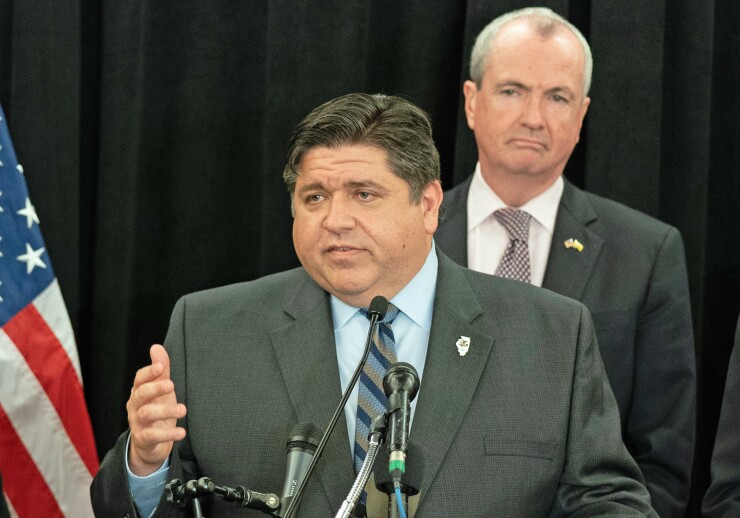Illinois Gov. J.B. Pritzker threw cold water on the idea of the state absorbing Chicago’s pension funds and their $28 billion of net pension liabilities, saying the state’s low-investment grade status couldn’t survive such a move.
Crain’s Chicago Business reported Friday that Chicago Mayor Lori Lightfoot was considering asking the state to consolidate the city’s pension funds with downstate public safety funds to create a new state pension fund as part of the effort to solve the city’s pension and budget woes. Lightfoot has not directly commented on the report.

The city needs more than $700 million in new revenue or spending cuts in 2020 due to rising personnel, debt and pension contributions. The city’s pension funding is shifting to an actuarial level between 2020 and 2022 to reach a 90% funded ratio from the current 26.5% ratio in the coming decades.
“The state is at just above junk status in its credit rating so there are not liabilities that can be adopted by the state that would not drive us into junk status … that is not something that we can do,” Pritzker said at a public appearance Monday alongside Lightfoot to highlight transit funding in the state’s new $45 billion, six-year capital package.
The state is grappling with its own pension quagmire as its pension system is just 40% funded and has a $133.7 billion unfunded burden that weighs on its weak ratings. The more than 600 downstate public safety pension funds carry a combined $10 billion unfunded tab and local governments are struggling to keep up with required contributions.
Moody’s Investors Service included the state’s “substantial assumption of debt or pension liabilities incurred by local governments” as one of three factors along with renewed growth of the bill backlog and a reduction in pension contributions for fiscal relief that could trigger a state downgrade. The list was included in Moody’s June 4 report affirming the state’s Baa3 general obligation rating and stable outlook.
S&P Global Ratings also rates the state at the lowest investment grade level of BBB-minus with a stable outlook while Fitch Ratings has the state one notch higher than the other two at the BBB level with a negative outlook.
Pritzker said the state is committed to helping out all local municipalities grappling with pension strains and will look at a range of options but he offered little in the way of solutions beyond the potential consolidation of the downstate public safety funds. A state task force is expected to report back on consolidation ideas this summer with the aim of better leveraging existing resources to raise return levels and save on administrative costs.
A separate task force is examining asset sales and transfers to help boost state pension funding.
Lightfoot was asked about her discussions with Pritzker on potential fiscal help and said the two, who met over the weekend, had not delved into specifics.
“We have not … spoken about specifics yet … we are going to work together cooperatively to see what we can get done” but first the city must work on cutting costs through efficiencies to get its “fiscal house in order … before we make any specific revenue asks,” Lightfoot said.
Lightfoot said she is considering seeking state approval for a levy on various professional services such as legal transactions at big law firms which she first pitched as an option during the campaign. “When we have a package of options finalized, we’ll present them to the governor and senior leadership in the General Assembly,” she said.
Lightfoot has pledged to solve the city’s structural fiscal woes even if the decisions hurt her re-election chances.
The city later this month will release its annual financial analysis that lays out the budget picture for the coming year and includes a multiyear forecast. She is also expected in July or August to lay out her proposals for tackling the city’s fiscal ills. The 2020 budget will be unveiled in October.
The Crain’s piece said Lightfoot was considering asking the state to tax retirement income above a certain threshold. The state currently does not tax any retirement income. She did not comment on that Monday, but Pritzker is opposed to such a tax.
Lightfoot said she has no plans to raise the motor fuel tax by up to 3 cents as local municipalities in Cook County are permitted to do under the new capital budget. The state plan is relying in part on a doubling of the 19-cent motor fuel tax. The city is looking “at other potential revenue sources” but not the motor fuel tax, she said.





